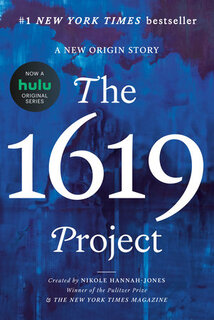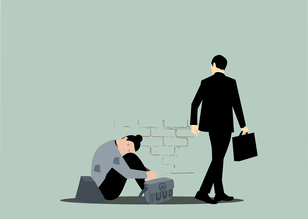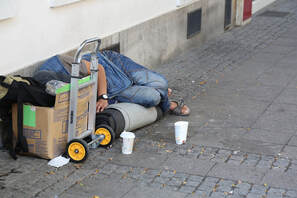 Everyone should read this. Everyone should read this. I’m not sure whether it has been by design or happenstance, but in recent months I have been consuming novels, history, and commentary by Black authors. Titles include His Name Is George Floyd, How to Be an Antiracist, The Bluest Eye, The Trees, Believing, and others. It has been eye-opening. Right now I’m one-third of the way through The 1619 Project. I cannot recommend it enough. Sadly, the people I wish most to read it won’t. Reasons will vary from understandable (too challenging for their reading level) to disheartening (their wells have been poisoned). For the former, there’s the audiobook. For the latter, maybe a few will set aside whatever they have been fed by their favorite media, politicians, and relatives and give the book a fair shot. Not that I’m holding my breath. ❖
0 Comments
 Bit of advice to copywriters: The adage that “people buy benefits, not features” is true. So if you want to persuade, don’t make your case solely on what your product is, aka, its features, but on what it does for your reader. The usual accompanying adage, “people don’t buy quarter-inch drill bits, they buy quarter-inch holes” is just plain wrong. Like a drill bit, a hole is an is, not a benefit. Here is what holes do: let you sink screws; drain water; create air flow; feed pipes, tubes, or wires; see what’s behind a wall; and more. To find the benefit behind a feature, try appending the words “so you”: This bag has an easy-open tab [feature], so you [possible benefits:] won’t break a nail / won’t have to strain / won’t spill / won’t have to use scissors or pliers / won’t have your kids overhear you using words you’d ground them for using. Whatever you do, beware the default benefit ... Sooner or later comes this flash of would-be brilliance about your service: It saves time!
Guess what. Most services save time. It is the default benefit. It sets no one apart. If “saves you time” is where you’re headed with your copy, stop and think harder.  IT’S REMARKABLE, the assertions we grow up accepting that turn out not be true. (Go ahead and buy that red car. No, you won’t get more tickets.) I stumbled upon taking an evidence-based approach to claims, and the importance of avoiding common thinking errors, some years ago. At the time, it was for me little more than intellectual entertainment. I mean, so what if people believed Bigfoot was real, the lunar landing was faked, or dogs predict earthquakes? But if misinformation was ever quaint, it no longer is. It has, in fact, become downright deadly.
Misinformation dehumanizes innocent people, sends gunmen into pizza parlors, scares people from life-saving vaccines, convinces people that windmills cause cancer, sends a mob to overthrow the government, convinces people that an electrical pulse is a heartbeat, lures the sick into trading proven medical treatments for quackery, and more. I wrote a column for The Salt Lake Tribune outlining basic steps for evaluating claims. It’s short, and you can read it on this website by clicking here. I hope you enjoy it. Better yet, I hope someone applies it.  MY HOME isn’t the best at keeping out outdoor temps. Yet even as I try to coax peak performance from its HVAC system in the worst of winter and summer, I remember people throughout my city who live in tents or have no shelter whatsoever. I kick in my widow’s mite with every paycheck. It does only a little to assuage my awareness of how much more I could do. Yet the United States has the wealth to ensure the basics of Maslow’s Hierarchy for everyone within its borders. I would gladly pay the trifling tax increase to cover the cost. Better yet, the U.S. could cover the cost with no increase at all by building fewer bombers, subsidizing fewer oil companies, or loopholing fewer obscenely rich people out of paying their fair share. Either way, it is immoral that anyone should go without shelter, food, and medical care in this land of excess. “I don’t want to feed and shelter drug dealers,” one person argued. I get it. Trouble is, carving out even one exception opens the door to more exceptions. As recent history makes clear, it wouldn’t be long before proudly Christian politicians moved to exclude swaths of people they deemed unsavory, such as addicts, the LGBTQ+ community, undocumented immigrants, documented immigrants from the “wrong countries,” people who “need tough love not enabling,” members of the “wrong religion,” people who “just don’t want to work,” and more. I would rather risk feeding the scum of the earth, even in perpetuity, than trust anyone with deciding who does and who doesn’t get to eat or keep warm. No one in this country should have to do without shelter, food, and medical care. No one. * * *
“Homeless” versus “unhoused” Sometimes on our walks, my dogs and I pass a row of tents. It’s not unusual for the dogs to try to nose their way in. “No,” I tell them, pulling gently back on the leash, “that’s someone’s home.” A sidewalk tent may not seem like much of a home to some, and it is almost certainly illegally placed, but it is nonetheless someone’s home. That’s one reason I like referring to its occupants as “unhoused” rather than “homeless.” Another is that I find “unhoused ” more humanizing. Er, “sweeping”? I don’t pretend to have a solution for helping the unhoused. But it’s not hard to recognize non-solutions. Take the city of Portland, Oregon, my home as of two years ago. Last week, The Oregonian reported, “In mid-October, the city of Portland removed more homeless encampments than at any point since the start of the pandemic, sweeping 87 in a single week.” Er, “sweeping?” The unhoused are not debris. They are people. A few lines later was this gem: “It’s unclear where the people who lived in those camps have gone.” Thus the city’s “solution” becomes clear. The objective is not to help the unhoused. It is not to address causative, systemic factors. It is to move the unhoused out of one neighborhood’s sight and into another’s, and, when the second whines, to move them again. Move the man who fell among thieves out of view, and the Good Samaritan need not haunt us. The laziness myth I bristle at the likes of “they’re lazy” and “they just don’t want to work.” I’d be curious to know how the glib condemners eliminate other possibilities, such as catastrophic health events, job losses and other economic factors, accidents, provider deaths, legal machinations, mental illnesses, or convergences of miscellaneous bad luck, to name a few. They’re lazy? Really? Being unhoused doesn’t resemble a lazy person’s paradise from where I’m standing. Imagine: living in a tent, under a viaduct, or in a park; digging through trash for food and clothing; suffering through constant exposure to weather extremes; getting along without indoor plumbing, therefore no toilet, washbasin or shower; living without heating or cooling; putting up with public scorn; having no access to health care; having no car; having no electricity; having no online devices or access; and more. I don’t know anyone who would choose that lifestyle at all, much less out of laziness. I, for one, am too lazy to attempt it. Some unhoused are employed. In this country, employers are not required to pay a living wage. Holding a full-time job is no assurance of being able to rent, much less buy, a home. Think about that if you scorn the unhoused and oppose raising the minimum wage. Imagine you’re an employer. Now stroll through an encampment or past unhoused persons roaming the street. Which ones would you hire? To do what? What’s that, you say? No one there you’d hire? Then maybe it’s not as simple as “They don’t want to work.” The they’re lazy / they don’t want to work rhetoric serves only one purpose. It makes being unhoused a choice, a morally defective choice at that. Thus to help is to enable. What they need is tough love! That is how you turn “helping” into “not helping” and “not helping” into “helping.” It is how people feel righteous about reacting to the unhoused with scorn instead of empathy. Victim-blaming, which this is, is nothing new. “They’re lazy” and “they don’t want to work” are victim-blaming dressed up in well-worn, hand-me-down clothes. ***
 A CALIFORNIA UNIVERSITY where I majored in music required weekly recital attendance. Most performances exhilarated. But the one in which a solo artist played a “piece” for grand piano, pitcher of water, drinking glass, and deck of cards stood out as an exception. The performer fist-bonked and slapped piano keys at seeming random, poured water into the glass, sipped from the glass, bonked and slapped more keys, shuffled the deck of cards, tossed a few cards onto the strings inside the grand piano, and then bonked and slapped the keys again, which made the cards somersault this way and that. This he managed to keep up for an hour. An hour. I left resentful. I was working in a department store, putting myself through school. I didn’t have many hours to waste, and if I was going to waste one, I wanted to waste it in a manner of my own choosing. But then, I suppose the hour wasn’t a complete loss. I did derive some entertainment from overhearing fellow music majors discuss “the piece” on their way out of the auditorium. It was “interesting.” “Quite the statement.” “Motif and development …” Lest you ask, yes, they were serious. I often recall that moment after consuming literature, music, or art that critics and/or sophisticates have been raving about, only to find myself thinking, What on earth were the critics smoking? Sometimes there is anti-intellectualism. Sometimes there is recognizing that would-be sophisticates sing praises of the godawful solely to display, as they suppose, their elevated taste.  Dear Friend: Say I decide to grouse. Like, “I always seem to end up in the slowest-moving line at check-out counters.” Please take my grousing as an invitation to converse. A possible conversation-promoting response might be something like, “I hear you. Don’t you hate that? Just like in traffic, when you finally switch to the faster-moving lane and the one you just left speeds up.” But if you’d rather drop a sure conversation-killer, take my grouse as a problem for you to solve. You might reply with something like, “Just shop during off-hours when the lines are short.” Or, if you have delusions of subtlety, mitigate it somewhat, like, “Doesn’t happen to me, because I always shop during off-hours.” Besides stopping the conversation cold, you will have suggested that I was seeking a solution, not connection, that shopping during off-hours hadn’t occurred to me, and thank god for your wisdom and experience. Call it mansplaining, which, despite the moniker, is not exclusive to men, or call it being a fixer. Either way, you do it more than you realize, and it’s more annoying than you think. I’m a recovering mansplainer, so I get it. It was a marriage counselor who finally helped me understand that sometimes people want only to be heard, not fixed. The timing couldn’t have been better, because later that day I came home to a screaming match between my now late wife and my then 11-year-old daughter. My daughter wanted a certain girl excluded from the school carpool, and my wife was trying to explain why that wasn’t possible. Turning to me, my wife spat out, “YOU deal with her” and stormed off. Old Me would have tried to talk sense to my daughter. But, recalling the marriage counselor’s advice, I tried a different approach. I asked my daughter, “Why do you want X out of the carpool?” My daughter said, “Because she’s stupid and stinky.” “Yeah,” I said, “I wouldn’t want to ride with a stupid, stinky person, either.” “Yeah!” said my daughter, and walked off happy. Hmm, I thought, maybe there’s something to this validation stuff. Sincerely, Me  SOMETIMES my fingers fly over the keyboard and, voilà, a publishable article. But sometimes the process is like pulling teeth. The article I’m working on right now is of the latter sort. I am 20+ hours into it and have completed but three short paragraphs. Which I will almost certainly rewrite. I plug away because, having done this before, I know that great satisfaction awaits me upon completion, at that blessed moment when I read it through and say, “This works.”  I’m a perfect example of what happens when you don’t censor what your kids read. By age 10, I was reading classics, murder mysteries, current events, spy novels, adventure novels, horror novels, history, sociology, science, and even parts of the New Testament. Know what? Shakespeare didn’t lead me to fake suicide in the name of love; Dostoevsky didn’t make me rationalize, plot, and carry out a murder; William Golding didn’t make me hunt with intent to kill my classmates (not even the ones who arguably deserved it); Mary Shelley didn’t make me reanimate dead tissue; and Luke didn’t lead me to strike people dead for lying about their income. Reading didn’t shape my values. It helped me shape them. It did so by making me think about the characters, the issues, and how characters dealt with issues. And by allowing me to weigh their thoughts and actions for myself. Some adults have been adults for so long that they forget what they could handle when they were young. Let your kids read. They can handle it. If you’re worried, don’t take away the books. Rather, get involved. Read the books for yourself, and then discuss them with your kids. I loved it when my kids shared with me the books they were reading. Now my grandkids do the same. It’s a huge compliment, an invitation into their world and minds, and an opportunity to bond and, yes, to help shape values. No ill comes from deepened perspective and broadened horizons. A good deal of ill comes from the lack.  A SECURITY services salesperson just showed up at my door. I’d name the company, but I really don’t feel like getting sued today. Suffice it to say you’ve heard of it. “We’re offering an advertising special,” he opened. “If you’ll display our yard sign and window decal, we’ll install the electronics for free and only charge you the monthly monitoring fee. “Suppose I take the service but refuse to display the signs,” I said. “Then what will the electronics and installation cost me?” “Nothing,” he replied, “just the monthly.” “Two things,” I said. “First, I don’t need the service. I have a four-legged, 60-pound security system with a full set of teeth. The only reason she hasn’t had you for an afternoon snack is that I gave her a stay command. That, and because she ate the UPS guy for breakfast, so she’s still full.” He looked past me at my dog and allowed that she is a beauty. Which she is. “Second,” I continued, “—and please know that my gripe is not with you, but with the company that fed you this pitch—there’s no advertising special. That’s evident from the fact that the price is the same either way. So your employer has trained you to use a sales pitch that opens with a lie. I suggest you go back and yell at your employer. Ask them not to make you lie.” He was gracious. He thanked me. Then he went to the next house. |
Welcome to Cunoblog... where I share thoughts about writing. I don’t consider myself a writing authority, but that doesn’t keep me from presuming to blog like one. Oh, and I reserve the right to digress when I feel like it. Archives
July 2024
|

 RSS Feed
RSS Feed